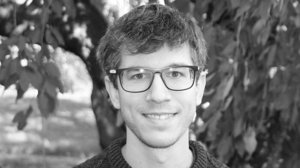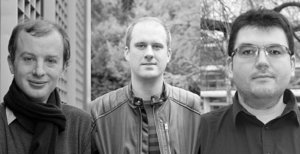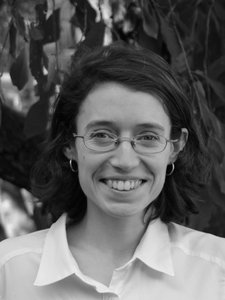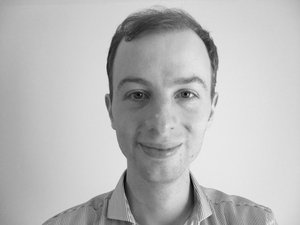
Highlights
Institute's News
Call for Distinguished PKS Postdoctoral Fellowship 2022 now open!
Application deadline: 24 November 2021. Distinguished PKS postdoctoral fellows appear personally along with the departments and groups on the main research page of the institute and are expected to have at least one year of postdoctoral experience at an institution other than the one at which their PhD was awarded. Applications for this fellowship directly after completion of the PhD might be considered in exceptional cases.
Please click on the link- button to see the full advertisement!
Read moreInstitute's News
New Research Group - The Physics of Living Matter
We cordially welcome Ricard Alert at the institute! Ricard joins MPI-PKS from Princeton University and establishes the research group "The Physics of Living Matter". The group aims at uncovering physical principles of living matter. In particular, it will develop the physics of active matter to understand collective behaviors in cells and tissues. The group's research topics include collective cell migration, self-organization in bacterial colonies, active turbulence, mechanochemical patterns in tissues, mechanically-regulated tissue growth, and active fluctuations in cells. Ricard is also a member of the Center for Systems Biology Dresden and strengthens the collaboration of MPI-PKS with experimental groups at MPI-CBG.
Read moreNews
MPI-PKS kicks off the year with 3 new research groups
A warm welcome to three new research group leaders at the institute! Pierre Haas joins us from the University of Oxford and heads the research group "Self-Organization of Multicellular Systems". The group is based jointly at the Center for Systems Biology Dresden, the MPI-PKS and the MPI-CBG and will focus on the mechanics of cells and tissues. In particular, Pierre's group is interested in deriving the continuum theories that represent the rich mechanical behavior of tissues during development and thus allow understanding how robust development is compatible with mechanical constraints and biological variability. While the research of the group is theoretical, it will work in close collaboration with experimental groups at the MPI-CBG and beyond.
Matt Eiles originally joined MPI-PKS from Purdue University and was a Distinguished PKS Postdoctoral Fellow until December, now heading the new group "Correlations and Transport in Rydberg Matter" associated with the Finite Systems Division. Via the study of Rydberg matter the group aims to answer fundamental questions about atomic structure, low-energy collisions and scattering, and the behavior of ultracold gases, while also raising new questions related to localization, transport, highly correlated systems, quantum chaos, semiclassical dynamics, and quantum simulation. A strong relationship with ongoing experimental work and the flexibility of Rydberg atoms to shed insight into new theoretical inquiries motivate their research.
Marko Popovic comes to Dresden from the EPFL Lausanne and establishes the research group "Order and Disorder in Driven Systems" associated with the Biological Physics Division. The group will investigate mechanical and rheological properties of out-of-equilbrium systems, with an emphasis on development of biological tissues and the role of structural disorder. Furthermore, emergence of order in biological systems and its relation to tissue mechanical properties will be of particular interest.
Welcome to the institute and have a great start!
Read moreInstitute's News
New Research Group Correlations and Topology
A warm welcome to Ashley Cook who joined us from the University of California in Berkeley and heads the new research group on correlations and topology! The research will focus on the effects of correlations and topology in condensed matter systems, with special emphasis on searching for novel phases of matter and exploration of mechanisms for experimental realization of exotic phases of matter. This group aims to accelerate the process of transitioning from introduction of novel phases of matter into the literature to experimental realization and finally applications, merging what have previously been more disparate areas of expertise. While the research group focuses on theoretical condensed matter physics, it will work in close collaboration with experimental groups, in particular those at MPI-CPfS.
Read moreInstitute's News
Call for Distinguished PKS Postdoctoral Fellowship 2021 now open!
Application deadline: 25 November 2020.
Distinguished PKS postdoctoral fellows appear personally along with the departments and groups on the main research page of the institute and are expected to have at least one year of postdoctoral experience at an institution other than the one at which their PhD was awarded. Applications for this fellowship directly after completion of the PhD might be considered in exceptional cases.
Please click on the link- button to see the full advertisement!
Read moreInstitute's News
New Research Group at the Center for Systems Biology Dresden starts in January 2021
Starting in January 2021, Pierre Haas will lead the research group 'Self-organization of Multicellular Systems' at the Center for Systems Biology Dresden. The research of the group will focus on the mechanics of cells and tissues, with a particular interest in deriving the continuum theories that represent the rich mechanical behaviour of tissues during development, and to understand how robust development is compatible with mechanical constraints and variability. While the research of the group is theoretical, it will work in close collaboration with experimental groups at MPI-CBG and beyond.
Read moreInstitute's News
Call for ELBE postdoctoral Fellowships at the Center for Systems Biology Dresden now open!
Application deadline: 25 September 2020.
The ELBE program seeks outstanding external candidates who are passionate about bringing new ideas, concepts, or systems to the Center. ELBE postdoctoral fellows pursue an interdisciplinary research project in collaboration with members of the CSBD. They are encouraged to develop and use theoretical or computational approaches to study biological systems in close collaboration with experimental groups at the MPI-CBG and the TU Dresden.
Ideal candidates should have backgrounds in physics, computer science, mathematics or a related discipline, with a strong interest in working in a cross-disciplinary life-science environment. In some exceptional cases, ELBE fellows can be analytically-minded experimentalists in the field of cell or developmental biology, who work between a lab and a CSBD research group.
Please click on the link- button to see the full advertisement!
Read moreInstitute's News
Next Step Fellowships at MPI-PKS
Our institute now offers Postdoc and PhD fellowships for scientists who were planning to leave Europe and take up their next position outside of Europe but currently cannot do so due to the covid19 pandemic. Applications are reviewed regularly, with the next deadline on 7. July 2020.
Read moreInstitute's News
MPI-PKS launches virtual workshop jointly with ICTP
In times of severe travel constraints or even lockdowns, MPI-PKS is determined to provide opportunities for scientists to meet, now remotely. As a pilot event, we are launching a two-day virtual workshop jointly with ICTP in Trieste, focusing on Real-time Dynamics in Strongly correlated Quantum Matter.
Read moreInstitute's News
New Clusters of Excellence for the TU Dresden - The MPIPKS is part of two new Dresden clusters
The German Research Foundation (Deutsche Forschungsgemeinschaft) announced the new Clusters of Excellence in the framework of the Excellence Strategy of the German Federal and State Governments. The TU Dresden received three new Clusters of Excellence: "Physics of Life", "Center for Tactile Internet", and "Complexity and Topology in Quantum Materials" jointly with the University of Würzburg.
The Max Planck Institute for the Physics of Complex Systems is involved in two of the new Dresden Clusters: "Physics of Life" and “Complexity and Topology in Quantum Materials".
- "Physics of Life"
- “Complexity and Topology in Quantum Materials"
Read more- "Physics of Life"
- “Complexity and Topology in Quantum Materials"




